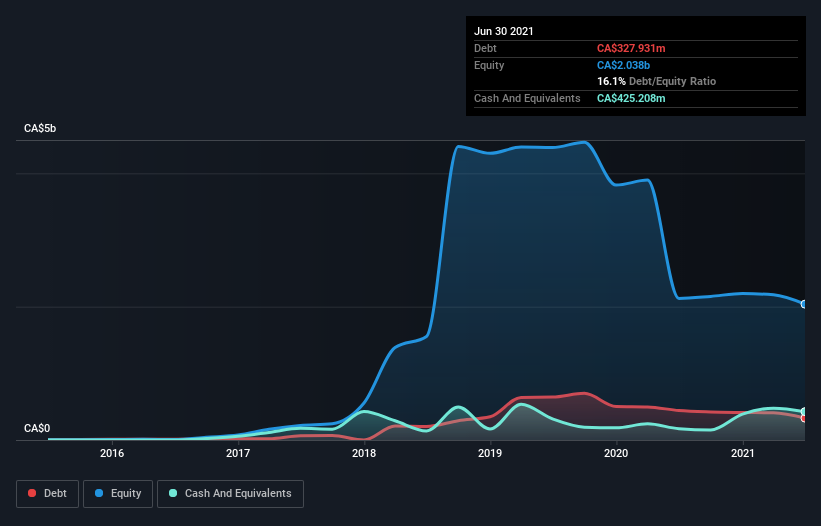
The external fund manager backed by Berkshire Hathaway's Charlie Munger, Li Lu, makes no bones about it when he says 'The biggest investment risk is not the volatility of prices, but whether you will suffer a permanent loss of capital.' When we think about how risky a company is, we always like to look at its use of debt, since debt overload can lead to ruin. We can see that Aurora Cannabis Inc. (TSE:ACB) does use debt in its business. But the more important question is: how much risk is that debt creating?
When Is Debt A Problem?
Debt assists a business until the business has trouble paying it off, either with new capital or with free cash flow. Part and parcel of capitalism is the process of 'creative destruction' where failed businesses are mercilessly liquidated by their bankers. While that is not too common, we often do see indebted companies permanently diluting shareholders because lenders force them to raise capital at a distressed price. By replacing dilution, though, debt can be an extremely good tool for businesses that need capital to invest in growth at high rates of return. The first thing to do when considering how much debt a business uses is to look at its cash and debt together.
See our latest analysis for Aurora Cannabis
How Much Debt Does Aurora Cannabis Carry?
You can click the graphic below for the historical numbers, but it shows that Aurora Cannabis had CA$327.9m of debt in June 2021, down from CA$441.0m, one year before. But on the other hand it also has CA$425.2m in cash, leading to a CA$97.3m net cash position.

A Look At Aurora Cannabis' Liabilities
The latest balance sheet data shows that Aurora Cannabis had liabilities of CA$116.4m due within a year, and liabilities of CA$450.7m falling due after that. Offsetting this, it had CA$425.2m in cash and CA$56.5m in receivables that were due within 12 months. So it has liabilities totalling CA$85.3m more than its cash and near-term receivables, combined.
Given Aurora Cannabis has a market capitalization of CA$1.78b, it's hard to believe these liabilities pose much threat. Having said that, it's clear that we should continue to monitor its balance sheet, lest it change for the worse. Despite its noteworthy liabilities, Aurora Cannabis boasts net cash, so it's fair to say it does not have a heavy debt load! When analysing debt levels, the balance sheet is the obvious place to start. But it is future earnings, more than anything, that will determine Aurora Cannabis's ability to maintain a healthy balance sheet going forward. So if you want to see what the professionals think, you might find this free report on analyst profit forecasts to be interesting.
Over 12 months, Aurora Cannabis made a loss at the EBIT level, and saw its revenue drop to CA$245m, which is a fall of 8.7%. That's not what we would hope to see.
So How Risky Is Aurora Cannabis?
We have no doubt that loss making companies are, in general, riskier than profitable ones. And the fact is that over the last twelve months Aurora Cannabis lost money at the earnings before interest and tax (EBIT) line. Indeed, in that time it burnt through CA$264m of cash and made a loss of CA$692m. With only CA$97.3m on the balance sheet, it would appear that its going to need to raise capital again soon. Summing up, we're a little skeptical of this one, as it seems fairly risky in the absence of free cashflow. When analysing debt levels, the balance sheet is the obvious place to start. However, not all investment risk resides within the balance sheet - far from it. For instance, we've identified 3 warning signs for Aurora Cannabis (1 is significant) you should be aware of.
At the end of the day, it's often better to focus on companies that are free from net debt. You can access our special list of such companies (all with a track record of profit growth). It's free.
New: Manage All Your Stock Portfolios in One Place
We've created the ultimate portfolio companion for stock investors, and it's free.
• Connect an unlimited number of Portfolios and see your total in one currency
• Be alerted to new Warning Signs or Risks via email or mobile
• Track the Fair Value of your stocks
This article by Simply Wall St is general in nature. We provide commentary based on historical data and analyst forecasts only using an unbiased methodology and our articles are not intended to be financial advice. It does not constitute a recommendation to buy or sell any stock, and does not take account of your objectives, or your financial situation. We aim to bring you long-term focused analysis driven by fundamental data. Note that our analysis may not factor in the latest price-sensitive company announcements or qualitative material. Simply Wall St has no position in any stocks mentioned.
Have feedback on this article? Concerned about the content? Get in touch with us directly. Alternatively, email editorial-team (at) simplywallst.com.
About TSX:ACB
Aurora Cannabis
Engages in the production, distribution, and sale of cannabis and cannabis-derivative products in Canada and internationally.
Excellent balance sheet with reasonable growth potential.


